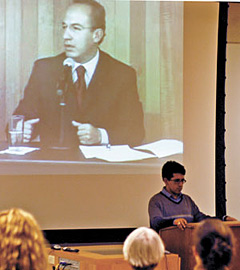 |
 |
 |
 Business News | December 2005 Business News | December 2005  
Teleconference Lets Mexican Presidential Candidate Spread Message to Students
 Adam Foxman - Daily Bruin Adam Foxman - Daily Bruin


| | Sociology professor Ruben Hernandez-Leon moderated a teleconference between UCLA students and Mexican presidential hopeful Felipe Calderón held Friday at the Anderson School of Business and Management. (Adam Foxman/Daily Bruin) |
The video feed was jerky and the sound was sometimes low, but for Luisa Martínez, it was an experience to be remembered.

Martínez, a fourth-year mechanical engineering student, was one of about 15 members of the UCLA Community who came to the Anderson School of Management Friday to participate in a video conference with Felipe Calderón, a Mexican politician who recently won a primary election to be a candidate in Mexico's 2006 presidential election in July.

"It's incredible, not even students from Mexico have this opportunity," said Martínez, who grew up and completed high school in Mexico.

Calderón is a member of Mexico's National Action Party, or PAN. PAN is also the party of current Mexican president Vicente Fox, who will not run in the 2006 election.

Responding to questions from both a Mexican audience and the participants of the UCLA event, which was sponsored by the UCLA International Institute and the Latin American Center, Calderón spent part of the meeting outlining how he would deal with challenges such as the possibility of ruling with a legislative minority and Mexico's high crime rate if he is elected. But he also touched on issues that resonate north of the border, such as violence against women, immigration and drug trafficking.

Violence against women is widespread in Mexico: in 2003, 10,949 women died in Mexico as a result of violence, according to a Nov. 25 article in the La Opinion, a Los Angeles-based Spanish-language newspaper.

And more than 400 women have been murdered in the cities of Juarez and Chihuahua since 1993, according to Amnesty International USA.

Speaking in Spanish, Calderón said he would combat domestic violence by working to change the perception that violence in the home is outside the reach of government.

Noting that one in five Mexican women is abused at least once in her life, Calderón said if he is elected his administration would work to "eradicate" what he sees as "tolerant attitudes" toward domestic violence.

Calderón also called for cooperation from United States security agencies such as the FBI to deal with issues of frontier security and crime, such as the murders of women that have plagued the city of Juarez, which lies across the border from El Paso, Texas.

"We need, we urge, and we demand higher responsibility on the part of the authorities from the United States" to do their part in stopping crime on the frontiers, Calderón said.

The border is also a site of interest in the debate over illegal immigration into the United States, and its deserts claim hundreds of lives each year as people try to cross illegally from Mexico to the United States.

Calderón said legal opportunities for Mexican laborers to work in the United States – at least seasonally – could reduce the number of Mexican lives lost in attempted border crossings.

He also said he would push for gradual agreements that would improve conditions for Mexican workers in the United States, pointing toward proposals by senators John McCain, R-Ariz., and Edward Kennedy, D-Mass., which would give workers visas for up to six years, after which they would either have to leave the country or be in the process of getting a green card.

When speaking about specifically Mexican issues, Calderón distanced himself from Fox by proposing a way to avoid the pitfalls of his compatriot's administration such as attempting to rule with a legislative minority.

When Fox was elected in 2000, his party did not win a majority in the Mexican Congress, and his administration was often stalled as a result, said Ruben Hernandez-Leon, a UCLA professor of sociology who served as moderator for the UCLA portion of the conference.

Calderón said he hopes to be elected and have a legislative majority, but he would consider forming a coalition government if he is elected but his party has a minority in the Mexican Congress.

"If the majority doesn't come from the (voting) urns, I will form a coalition government," he said, noting that the details of such a novel arrangement would have to be worked out if it is necessary.

Calderón promised that, if he is elected, his administration would improve Mexico's security at many levels. He said he would "purify" the nation's police forces "from top to bottom," create a single service to keep track of criminal information and form a single federal police force in order to make his nation safer.

"The fight against delinquency ... is a war, and you win wars with strategy, with resources and with technology," he said, adding that information is an essential resource.

Another important part of the fight against crime is getting citizens to participate in the process and share the information that they have about criminals, and in order to facilitate this confidence, the perception of the government and its efficiency must also be improved, Calderón added.

After the hour-long discussion, some UCLA audience members said they were impressed by Calderón's candor.

"This was a great opportunity to see what he had to say on the various issues," said Hernandez-Leon. "He provided a very interesting response in terms of modernizing."

Martínez expressed a similar sentiment.

She supported Calderón before the event, and afterwards she said her ideas about the candidate were confirmed.

"He went to the point," she said. "That's what I like about this candidate."

afoxman@media.ucla.edu | 
 | |
 |



